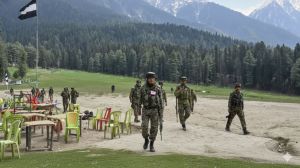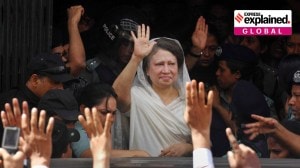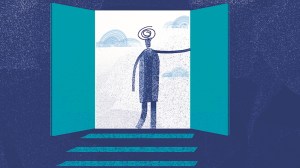Iron-clad logic
Gujarats ban of the Jinnah book reveals a dangerously illiberal reflex
He is considered the architect of the modern India,no one can show him in bad light, said Jaynarayan Vyas,the Gujarat state spokesperson,about Sardar Patel to justify the ban of Jaswant Singhs controversial book Jinnah: India-Partition-
Independence. Singhs telling apparently stains Patels steely reputation,and by extension,bothers all those in the BJP who have moulded themselves in Patels image,from Advani to Modi. Rather than a patriotic force of nature,if Patel is presented as someone open to compromise and even canny subterfuge on the matter of an inevitable Partition,that puts the skids under the BJPs attempt to appropriate him.
But whether dictated by party pieties or political gain,banning a book is inexcusable. Its not just Gujarat,of course in recent years,this illiberal streak has surfaced countless times over matters of art and representation,and it
inflicts a special damage when it prohibits us from examining the gnarls of the past that has produced us. In India,we like our historical figures super-sized and one-dimensional. We have processed the trauma of Partition by clearly assigning roles to its leading players Jinnahs malevolent ambition contrasted with Nehrus or Sardar Patels doughty crusade for a unified India. Any writing that challenges that stick-figure school of historiography is met with outrage and denial. Singhs book is purportedly another view of Jinnah,and one that also casts a large portion of responsibility on Congress manoeuvrings,on the Nehru-Jinnah competition and Patels role. In any case,questions of scholarly rigour or controversial hypotheses can be no basis for bans. But certainly,the idea that Jinnah alone might not have been solely responsible for Partition has been stated before,by writers from Maulana Azad to Ayesha Jalal. Partition was a formative moment,and a moment of rupture and subsequently,both India and Pakistan have tried to tell the story in ways that evacuate it of its messiness. But to understand an event like that historically is to have a handle on its complexity,its moral ambiguities,and the varied motives of its lead actors.
Faced with an unpalatable thought,the Gujarat governments reflex was to ban and proscribe. Only dysfunctional,nervous societies feel threatened by inquiry,and once the state starts deciding which ideas are permissible,we are indeed entering a very,very dark alley.
- 01
- 02
- 03
- 04
- 05































